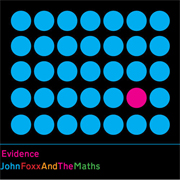For someone who seemed to drop off the radar completely between, say, 1983 and 2010, John Foxx has been pleasingly prolific of late. Evidence is his third album in as many years in collaboration with The Maths (aka Benge), and a cursory glance at the Foxx discography reveals over twenty albums released, in various guises and collaborations, since 1997 – disproving any notion that this Foxx has only recently broken cover (though he did in fact retire from music in the late eighties, working as an illustrator and art lecturer under his given name of Dennis Leigh). It’s obvious by now that this is no revival act, so perhaps it’s time that we stopped comparing Foxx’s new output to that of his perceived heyday – as frontman of Ultravox mk.1 and solo hitmaker with cult classics like ‘Underpass’ and ‘No-One Driving’ – and started judging it on its own merits, and by contemporary standards. For at age 65, Foxx the arch-futurist still more than measures up.
Evidence is an assemblage of sorts, a collection of tracks that Foxx and Benge recorded piecemeal over the last couple of years, some previously released, others not. It’s to the pair’s credit that the album hangs together as well as it does. It also contains some of John Foxx and the Maths’ most adventurous work to date, alongside some of their most accessible. Take the title track, previously issued as a limited edition single in cahoots with San Francisco darkwave psychedelicists The Soft Moon. If the Moon’s last LP, Zeroes, was full of great sounds but somewhat lacking in great songs, then this muscular, catchy track redresses the balance, Foxx’s strychnine-sharp vocal hooks sliding hard against booming, factory-fattened bass riffs. Defiantly modern yet instantly classic, this is moody synthpop heaven.
Cut from similar cloth is ‘My Town’, where Foxx’s vocals sound like he’s chewing up the gravel and the tarmac, spitting through the traffic and gorging on the confusion of digital and analogue radio signals. One criticism is that this potential urban anthem seems to cut out just as it’s getting started, like a fragment of a greater whole, a hymn to the metropolis only teasingly glimpsed. Instead, the track leads into a cover of Pink Floyd’s ‘Have a Cigar’, originally released on a Mojo cover-mount CD. Here Foxx’s vocals are even more heavily treated and robotic, emphasising the song’s message of the artist being swallowed up by the machine. You suspect, though, that Foxx almost relishes this experience, or that his solution is to become a more effective machine than the corporate music industry Floyd were originally satirising (not that difficult, to be fair). Foxx is obviously a Pink Floyd fan; I remember seeing him cover ‘The Great Gig in the Sky’ at a show several years ago, and he’s never been shy of admitting his roots in 1960s psychedelia. Here, he rehabilitates the track through a firm but respectful regime of calisthenics and discreet vitamin shots. The lingering, dope-smoking hippy slacker is banished, but not brutalised, and a tough, sinewy melody is teased out as the prog-rock flab falls away.
‘That Sudden Switch,’ with Xeno and Oaklander, is almost church-like, the choral minimalism of the vocals blending to baroque effect, while ‘Walk’ has the enervating alienation that is characteristic of Foxx’s finest work, casting him as an urban flaneur cruising the modern landscape, dispassionate in dystopia. This is Iggy’s ‘The Passenger’ without the directionless apathy; Foxx "walks," his deliberate forward movement a small but decisive existential act, the one positive, human choice he has left.
Elsewhere, Foxx and Benge trade remixes with Brighton electro-artist Gazelle Twin, Benge relocating the ghostly, yearning vocal from her song ‘Changelings’ into an endless alien landscape, Foxx forever lurking in the long shadows of the red dwarf sun. Gazelle Twin returns the favour on ‘A Falling Star’ from Interplay. Again, she strips the song bare and rebuilds it from scratch, not only creating a superior, more ambiguous version, both harder and more languorous, but also in a way emphasising the original’s late Roxy Music, brittle imperial grandeur. But it’s perhaps the instrumental pieces that most define the album; from the Orbital-esque skips and flutters of the opening ‘Personal Magnetism’ to the queasy spacewalk of ‘Neon Vertigo’ and the space shuttle piggy-back of ‘Cloud Choreography’ and ‘Shadow Memory’; pulsing, flickering fragments of what the androids really dream about.
Due to its somewhat odds n’ sods nature, Evidence is less an album in the traditional sense, and more a collection of possibilities; attractive angles and alternative futures. One thing’s for sure though, these tracks are nobody’s leftovers. How long Foxx and Benge will continue their partnership remains to be seen, but on any terms, Evidence is an impressive addition to their existing body of work.


